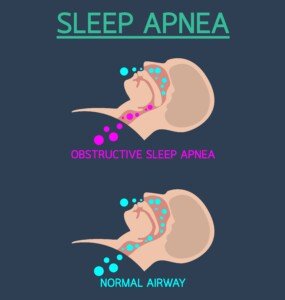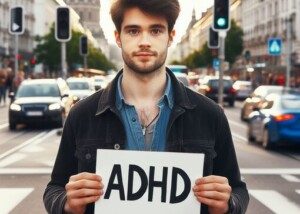
Sleep apnea not only is one of the most misdiagnosed conditions.
But many undiagnosed people are in denial that they might actually have it.
Though the stereotypical patient is an overweight middle aged man with a short thick neck, even skinny young children can be diagnosed with sleep apnea.
Three Kinds of Sleep Apnea
• Obstructive – Associated with structural issues with the throat as well as over-relaxed throat muscles. Obesity and male gender are risk factors, but thin people including women can have it.
• Central – The brain fails to send proper signals to the muscles that control breathing.
• Complex – Having both obstructive and central types.
Sleep apnea is a risk factor for heart disease, heart attack, stroke and vehicular accidents (due to the drowsiness and impaired alertness).

Shutterstock/iLoveCoffeeDesign
You Know You Probably Have Sleep Apnea When…
“You’re now sleeping on the couch because your bedpartner can’t take your snoring,” says Joseph Krainin, MD, board certified in sleep medicine and neurology and founder of online sleep apnea clinic Singular Sleep.
“Your bedpartner says, ‘I think I heard you die for a moment last night in your sleep,’” continues Dr. Krainin.
“You wake up after a full-night of sleep just as tired as when you went to bed.”
And you continue feeling as tired as a dog despite being up and about for an hour or two, even after washing your face and eating breakfast.
“You’re known around the office as ‘that person who always falls asleep in meetings’ at work,” says Dr. Krainin.
You also can be pretty sure you have sleep apnea when you feel a need for several naps throughout the day despite sleeping for eight hours (or what seems like eight hours).
Another tip-off that you likely have sleep apnea is that lately, you’ve become uncharacteristically irritable and grouchy, and/or have new-onset difficulty concentrating and focusing – that cannot be explained with changes in life situation or new medications.
Another red flag for sleep apnea is that, despite being well into adulthood, you’ve recently been diagnosed with attention deficit hyperactivity disorder (ADHD) or attention deficit disorder (ADD).
Did you know that the symptoms of sleep apnea and the symptoms that comprise ADHD or ADD are strikingly similar?
Not the snoring, of course, nor the gasps for breath while you sleep. But the mental or cognitive symptoms of sleep apnea are virtually identical to those of ADHD/ADD.
This is why when children are diagnosed with ADHD, parents need to zip them straight over to a sleep doctor for a full evaluation.
You may also have sleep apnea when your bed partner reports that you go long periods without breathing while asleep.
Your stomach suddenly stops rising up and down; it’s dead still – as though you’re dead. Then suddenly it goes up again for a breath, and breathing resumes.
Another red flag: Suddenly awakening feeling you can’t get in a breath.
And there’s more: awakening with headache (the deprived oxygen during sleep shorts the brain of oxygen).
Let’s not forget insomnia.
All of these symptoms can also be caused by unrelated issues.
But the more you have, the higher the index of suspicion for sleep apnea!

 In 2013
In 2013 







































